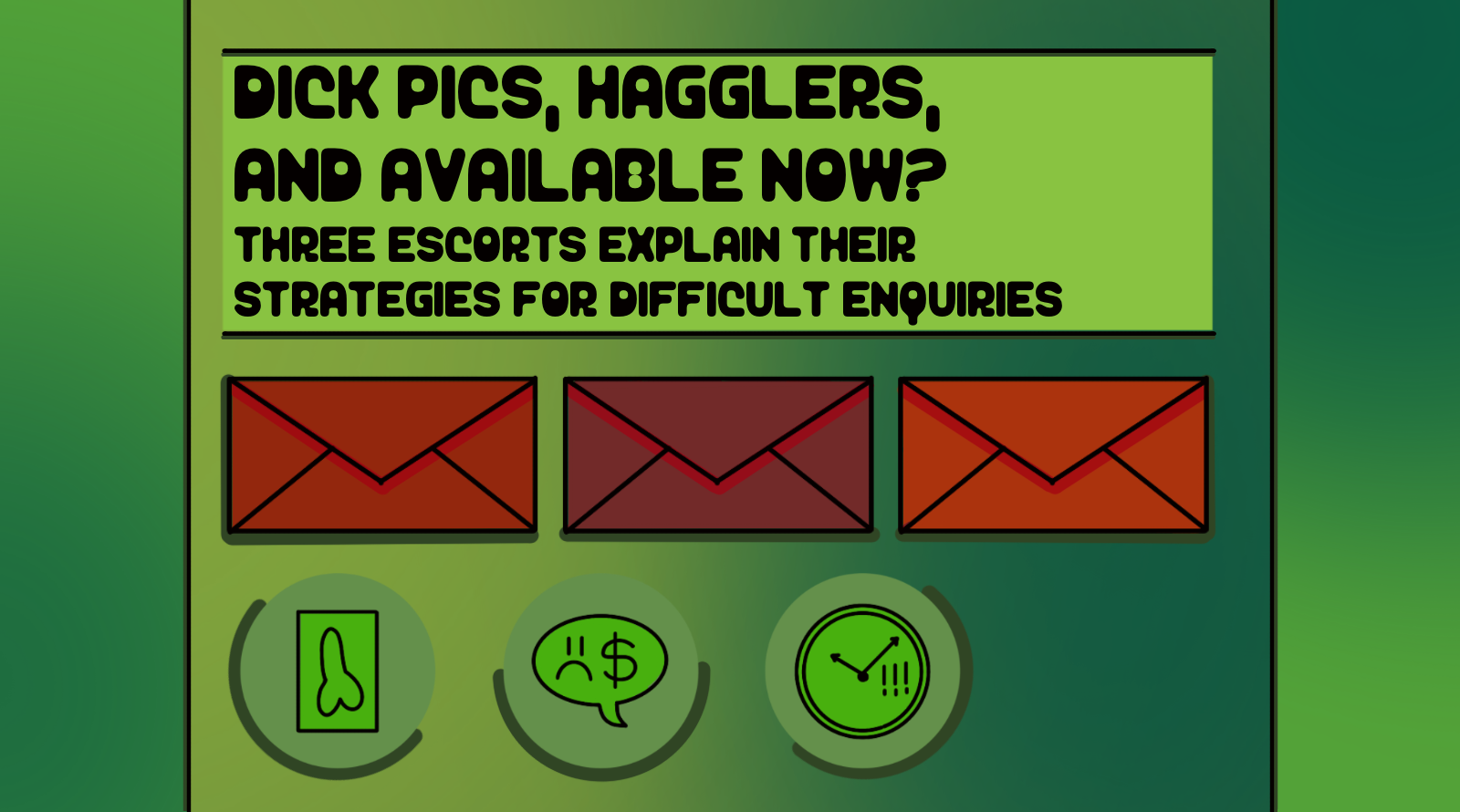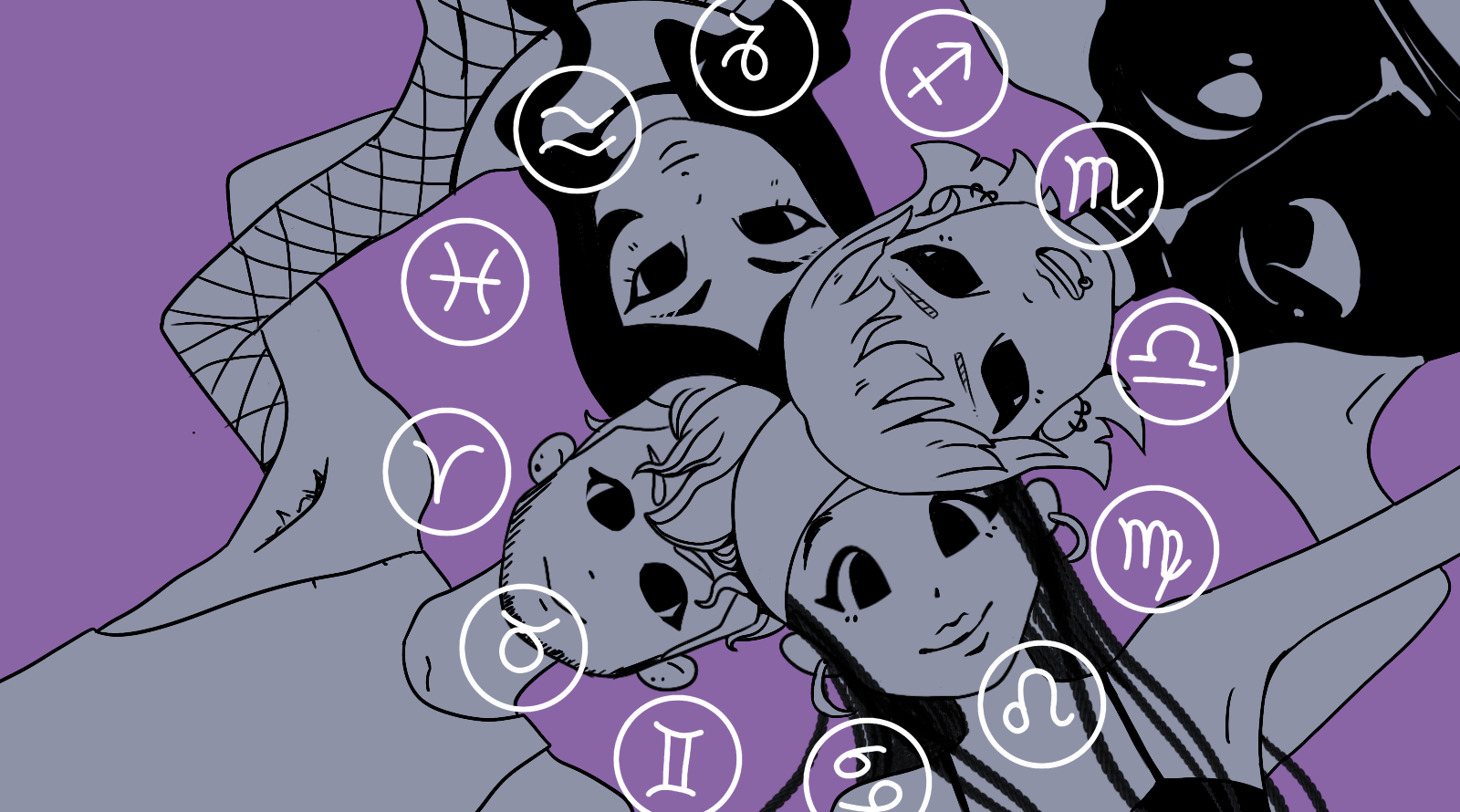What is it about being ‘new to the industry’ that attracts so many timewasters?
When I first began work as an escort, I didn’t get a legitimate enquiry for the first three months. Every day, I’d scroll through a seemingly endless stack of text messages saying ‘Hey’, ‘U avail now???’ and, ‘What will you do for twenty bucks?’ Delete, delete, delete. I wondered if I’d ever have a real, paying customer. I felt as though my lack of experience was a green flag to every tire kicker in Melbourne.
With patience, I got through it. Genuine clients began to appear. But for some time afterwards, I’d still flinch every time my phone ding-dinged with a new message.
As any experienced sex worker knows, the difficult enquiries never really go away. Is it a genuine lack of communication skills, or a poor attitude about the sex industry? Either way, problems such as dick pics, poorly-phrased booking messages, and screening request refusals continue to be an issue. It leaves me feeling exhausted, drained of the energy I’d prefer to save for my best clients.
I recently spoke with three experienced Aussie sex workers to find out how they handle these kinds of enquiries. They shared their responses and offered some amazing tips for keeping your stress levels down.
Introducing our experts
Our first ‘anti-timewaster warrior’ is Frankie James, a full-service independent escort working in Melbourne. She describes herself as a kink enthusiast. “I certainly wouldn't want to use any kind of specific labels around my kink practices, though,” she says.
Next: meet Rain Morgan, an independent escort and writer. She’s based in Melbourne, but travels extensively around Regional Victoria, New South Wales, and the ACT. Rain was recently awarded the Australian Adult Industry Awards 'Best BBW’ prize for 2022, and has previously been nominated for Best Fetish and Fantasy Provider three years in a row. Her time in the industry includes brothel work, although her work now predominantly focuses on BDSM and erotic massage services.
I’m also speaking with Alice Grey, a full service escort with more than nine year’s experience. She works mostly in Melbourne and sometimes travels to other parts of Australia. "I don't do it that often, because I have a lot of responsibilities that keep me based in Melbourne,” she says. “Mostly university related - I’m bound by the semester schedule."
Vague booking enquiries…is it worth responding?
We all know what it’s like to get emails or texts saying, ‘Hi!’ or ‘You’re so pretty!’ Sometimes a potential customer might say ‘I’d love to see you…’ but leave out crucial details such as their name, location, and when they’d like to meet.
Messages such as this can be frustrating - it’s very difficult to know you’re dealing with a genuine client who doesn’t know how to book, or a time waster who wants to draw you into a long, fruitless conversation.
Frankie James has a flexible approach to these kinds of people. “A lot of the time I don't respond. It depends on how busy I am. If my phone's really blowing up then, I'm not going to spend time on those kinds of messages.”
Sometimes, a repeated attempt to make contact can signal that the client is genuine. “When I've got the time or I'm hoping to get more work, I might take the time to try and engage…I might not respond that day, but if they message me back another day, then I'm like, 'Hey, I can tell you're actually interested'.”
But she also acknowledges that if a potential playmate isn’t willing to put an effort into their booking message, they probably won’t be much fun in the bedroom. “If the client just isn't trying very hard, then we're just not going to be the right match for one another…I have a pretty good idea of the kinds of people that I'm going to have a good time with. And basic communication is essential for me.”
Rather than responding on a case-by-case basis, Rain Morgan uses automation. “I have automated texts - ones that say, 'Please provide more information: your name, what city you're in, for what purpose are you booking?' I just have to space it out and press send - it's great.” If you use an Android phone, there are apps that allow you to save these kinds of messages and call them up at the touch of a button. On an iPhone the process is a little more complicated, but definitely possible.
If you’re artistic, she says, there are even more options. “I went into Canva and made little posters - images with all the information on my ads - each package that I have, the rates and the services. So when people haven't read the ad or are asking for services I don't offer, I just send them the photos.”
Frankie acknowledges that vague enquiries rarely lead to bookings. So she wants to remind potential clients who may be reading that the effort of writing a good message is worth it. “Saying, 'Hi, my name's Jamie. I'm super nervous. I've not done this before.' You have to be really brave to do that. But also, that's all you need to say for me to reply.”
Dealing with, ‘You available now?’
Next, let’s talk about that old favourite - the ‘available now?’ text.
It can happen to anyone, regardless of your price range or location. Sometimes these kinds of texts arrive at three in the morning, quickly followed by a string of ‘????’ as though the sender is offended that I’m not attending to them immediately.
Like me, Alice Grey finds this kind of contact infuriating. “I never respond to, 'You available?’” she says. “ It gives me that sensation that you get when someone is dragging their nails down a chalkboard.”
Alice’s advertising makes it clear that she requires advance notice. “I am famously unavailable - I've built my business that way.” She acknowledges that it’s a privileged position, but one that works for her situation. “If someone does want to say, 'Hey, any chance you're available today or potentially tomorrow?' I will say, 'Look, I'm really sorry. I would love to see you, but unfortunately I'm a busy lady and I do need at least a couple of days' notice, potentially a week.' People who genuinely want to see me will make the time.”
She points out that, for many customers, they’re simply repeating a pattern that’s tolerated, or even encouraged, in our fast-food, fast-fashion consumer culture. “We live in this world where we can jump on our phones and have food arriving within twenty minutes. We have everything at our fingertips. I don't think it's a personal slight that someone wants to see a sex worker at short notice.”
And, of course, some workers - especially those who are touring - might offer short-notice bookings. But ‘right now’ is rarely possible. Even with a short-notice engagement, we need time to prepare and the client needs time to actually travel to meet us. Alice suggests that those who have their hearts set on immediate gratification might be better off visiting a brothel.
Dick pics: always unwelcome.
‘Unsolicited dick pics’ can pop up in many places: in your Twitter messages, via text, or sometimes via email. They may be sent by complete strangers, or by clients as you progress through an otherwise smooth booking process. Just as the dating world, the unwanted penis selfie is both common and frustrating.
Frankie says that, for her, there are two ways dick pics can happen. Sometimes they come completely out of the blue - all by themselves, or alongside the first message. Or sometimes, a client might get excited during a discussion and send one unasked. “I ask people for photo ID as part of my screening process, and sometimes that gets followed by selfies,” she says. In this situation, she neither encourages nor discourages the behaviour. “I genuinely don't mind what people look like. It's not a big part of my connection with the client.”
And dick pics are always unwelcome. “My reaction is always shock or surprise, usually followed by disappointment and frustration. I understand how people get excited and horny - I get excited too. But there are still boundaries, and everybody's different - you just don't know what is okay, especially when it comes to the realm of sex and bodies and intimacy. Ongoing, enthusiastic consent is so important.”
Often, she simply deletes those messages, and doesn’t respond. “There are time wasters who send all sorts of wild stuff into people's DMs and phones, just trying to get a reaction.”
But sometimes she chooses to have a conversation about it, especially if she suspects the client has missed important social cues and gotten off track. “My response is to say, 'Hey, just so you're aware, what you've just done, in terms of sending me an unrequested picture of your genitals, is sexual harassment - or sexual assault, by some definitions. And you might think that that's a playful gesture, or you're really horny and it's okay because you've gotten carried away, but you've just crossed my personal boundaries in a really significant way.'”
Frankie acknowledges that no sex worker ever owes a client this kind of feedback. But she hopes her response might help change the person’s behaviour, not just for other workers but also for their romantic partners in future.
How to handle hagglers
‘I’ve only got $200, what can I get for that?”
“I’d love to see you but I can’t afford it…”
“I’m young and good-looking, will you give me a discount?”
One of the joys (and privileges) of being an independent sex worker is that we all have the right to set our rates as we see fit. Our peers provide services at all kinds of price points, and no matter the cost, the experiences we provide are all equally valid. Unfortunately, haggling happens to all workers. And it can feel incredibly discouraging to be confronted by someone who implies (or outright says) that they don’t think you’re worth the price you’re charging, no matter what that price is.
Alice has a lot of experience with this kind of behaviour. “I used to be one of those people who likes to engage in a little bit of aggressive discourse. I’d never swear at people, but I’d reply, 'Don't ever say that to people. That's so disrespectful.'” Those exchanges never led to a resolution, and she wound up feeling angry and exhausted.
She says, “I think the most productive response that I have is, 'Look, unfortunately, my rates aren't flexible. I do have clients that choose to save, and I'm always very flattered when someone tells me that they've been putting the money aside to see me. But I can't afford to do discounts just because I'm out of someone's price range.'”
For Rain, it’s about more than just thriftiness. As a ‘big, beautiful woman’ (BBW) worker, she’s often targeted by hagglers, simply because her body type doesn’t fit society’s ‘culturally acceptable’ beauty standards. “It’s the same with migrant workers,” she says. “Customers have this notion that fat people aren't worth as much. They think, 'You mustn't get as much work, so you're going to take my lower offer.'”
Some hagglers demand, while others try a softer approach. “They'll say, ‘I only have sixty dollars for you, will you take that?' They think if they're nicer, you're more likely to accept it.” But the prices she sets are already based on what she knows the market can handle. “I think we BBW workers know that sometimes we can't go as high as some other workers can go. And we definitely think about all of that stuff when we set our rates. So if clients can't afford it, they just shouldn't.”
Alice feels that engaging with hagglers is rarely productive. “I think a lot of people just hear a no, and then they go and try someone else.”
“It’s not a choice.” When clients refuse to screen.
Imagine you’ve been contacted by someone who sounds genine, and you’re a little way into the conversation. A date, time, and location has been arranged, services may have been discussed…and, at the last moment, they refuse to screen. They might baulk at sending a deposit, or be reluctant to give up personal details such as their full name, licence, or place of work. And just like that, the booking process grinds to a halt.
Post-COVID, there’s an additional step for many workers: proof of vaccination, or proof of a recent rapid test. And, as we know from those highly-publicised scenes in restaurants and aeroplanes, COVID safety protocols can trigger some very bad behaviour. Rain says, “I've been asking for vaccine certificates and sometimes there's a lot of pushback on that. Some clients are like, 'Why do you need that? You're going to scam me! You're gonna steal my identity!'
It can be difficult to let go of this kind of client, simply because so much time has already been invested in them. Less privileged workers may feel pressured to accept the job, despite feeling unsafe. Not everyone has the luxury of turning down a client that won’t provide screening information - but if you can, how should it be handled?
Alice finds that these kinds of people are often receptive to an honest conversation. “I like to say, 'This is why I do what I do'. And highlight that it's not about violating anyone's privacy, it's more about my safety.”
She prefers to handle each conversation on a case-by-case basis. “There was a time, recently, that someone wanted me to go to a residence very late at night in an area that I wasn't familiar with. And I said, 'I realise that I'm asking a lot from you. And I realise that this can be really intimidating. But, you know, you're asking me to go out into an unfamiliar area at a very late time of night, and I'm a little worried about my safety. It would make me feel so much safer if I could get this information from you.' They were quite receptive to that.”
Rain enforces her boundaries in a more direct fashion. “I say, ‘These are the rules. You can either meet them or we won’t see each other. These are the only options.’ I think being very firm around it is helpful. Just the same way people are firm when it comes to deposit.”
Alice respects that not all clients and workers will be compatible around screening requirements. “Way back when I used to take deposits and get people's full names and addresses, I had someone come back to me going, 'Look, I respect that you need to keep yourself safe. But I don't want to provide my full name.’ And we just had a 'thank you but no thank you' conversation around that. It was a nice interaction.”
Your boundaries - and your right to choose - are what matters.
Frankie, Rain, and Alice are experienced workers who, like you and me, have struggled with what to say to these kinds of inquiries, and how to manage their boundaries.
“It can be really hard,” Alice says, “When someone's messaging in a disrespectful way I want to bite back, tell them how inappropriate their question was. But I find that engaging in that sort of discourse just makes me feel bad. I'm not really teaching the other person anything. And I don't feel like it's resolved.” Those negative feelings made life difficult, particularly during Victoria’s pandemic lockdown, in-person work was prohibited.
Nowadays, she has an assistant who screens her messages and delivers scripted replies to certain types of enquiries. “It might feel a little bit impersonal to have a third party in play, but I want clients to rest assured that these are still my words. Everything that my assistant says gets approved by me first.”
Frankie acknowledges that every worker needs to make their own choices. “I think it's important that you’re aware of what's doable for you at a particular time. What you have capacity for that day, that week, that month, or your individual capacity.”
Managing difficult enquiries is part of the job, and it takes trial and error (and sometimes some arguments and tears) to figure out how to minimise the impact on your working life. So conserve your emotional labour, if you can. Decide what’s worth engaging with and what isn’t. Find hacks that make responding easier - such as an assistant, if you have the privilege to work with one, or simply preparing standard responses ahead of time. And, of course, there’s always the phone’s ‘block’ function.
No solution will be right for everyone, because we all work in different ways and under different circumstances. But swapping ideas - and knowing we’re not alone in having these experiences - can help save time, effort, and preserve your peace of mind.
Achieve your peak experience with sex workers
The Satisfaction Project is Georgie Wolf's comprehensive guide to sex workers, for clients just like you. Get the know-how for life-changing encounters with escorts and other independent, hands-on providers.





